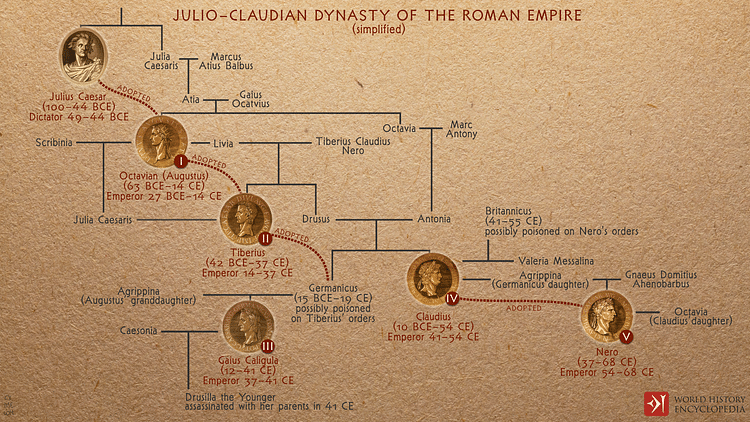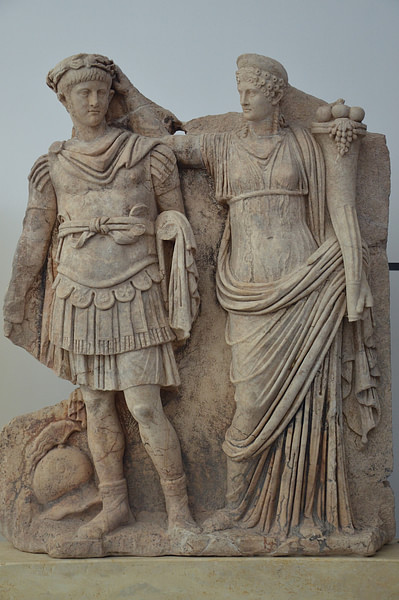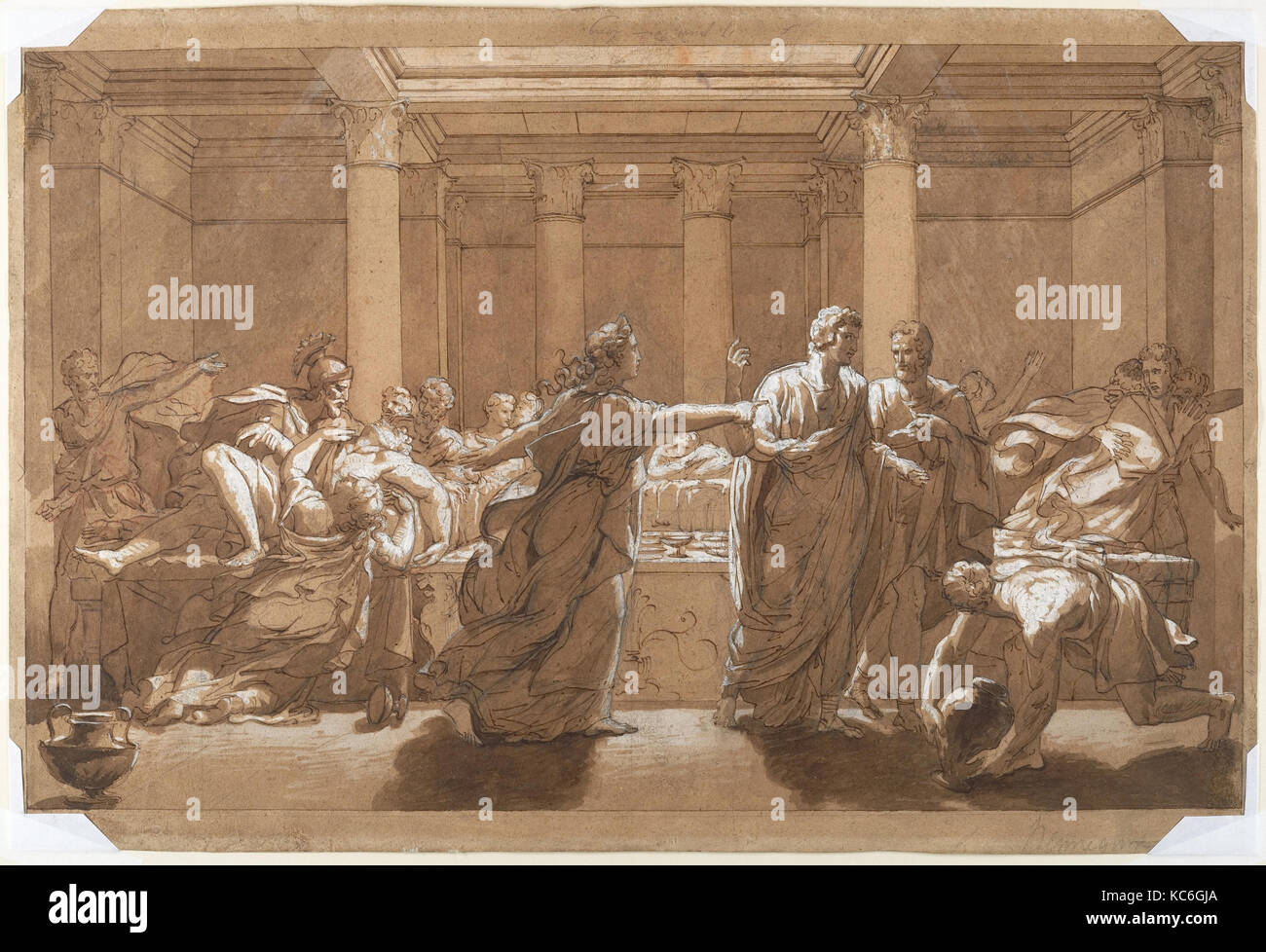Britannicus: The Tragic Heir of Imperial Rome
The Early Life of Britannicus
Britannicus, born Tiberius Claudius Caesar Britannicus on February 12, 41 AD, was the son of Emperor Claudius and his third wife, Valeria Messalina. As a direct descendant of the Julio-Claudian dynasty, he was thrust into the turbulent world of Roman imperial politics from birth. His name, "Britannicus," was bestowed upon him by the Senate to honor his father’s military victory in Britain, symbolizing the empire’s expansion.
Initially, Britannicus was groomed as the heir to the throne. He received a classical Roman education, studying rhetoric, philosophy, and military tactics under the watchful eyes of his tutors. His father, Claudius, though often underestimated due to his physical disabilities, was a learned ruler who sought to prepare his son for leadership. However, his privileged upbringing was overshadowed by the scheming and treachery that characterized the imperial court.
The Fall of Messalina and the Rise of Agrippina
Britannicus’s life took a dark turn when his mother, Messalina, fell from grace in 48 AD. Messalina, notorious for her scandalous behavior, was executed after plotting against Claudius. This left Britannicus without maternal protection in a court rife with intrigue. The political vacuum was quickly filled by Agrippina the Younger, Claudius's fourth wife and a formidable figure in her own right.
Agrippina, daughter of Germanicus and sister of Emperor Caligula, was determined to secure power for her own son, Nero, from her previous marriage. She manipulated Claudius into adopting Nero and positioning him as the primary heir, pushing Britannicus aside. This move was cemented when Nero was betrothed to Britannicus’s half-sister, Octavia, further consolidating his claim to the throne.
The Poisoning of Claudius and Nero’s Ascension
Claudius’s death in 54 AD marked the beginning of Britannicus’s tragic end. Many ancient sources, including Tacitus and Suetonius, suggest that Agrippina poisoned Claudius to ensure Nero’s succession. With Claudius gone, Nero was proclaimed emperor by the Praetorian Guard, leaving Britannicus—still a teenager—without allies. Though he was the biological heir, he was sidelined, and his influence waned under Nero’s regime.
The Downfall of Britannicus
Nero’s reign began with promises of moderation, but his paranoia and cruelty soon emerged. Britannicus, though young, posed a threat as a potential rallying point for dissenters. In 55 AD, just months after Nero’s accession, Britannicus died under mysterious circumstances. According to ancient accounts, he was poisoned during a banquet in the imperial palace.
The historian Tacitus provides a vivid account of the event, describing how Britannicus collapsed after tasting a drink that had been laced with poison. Despite his agonizing death, Nero allegedly feigned ignorance, declaring it a mere epileptic seizure. The public funeral was held hastily, and the memory of Britannicus was quickly suppressed.
The Legacy of Britannicus
Britannicus’s death marked the end of any legitimate challenge to Nero’s rule, but it also served as a grim reminder of the ruthless nature of imperial succession. His fate became a symbol of lost potential—a young man who could have ruled Rome but was instead sacrificed to political ambition.
Modern historians continue to debate the extent of Nero’s involvement in Britannicus’s death. Some argue that the murder was orchestrated by Agrippina, while others believe Nero acted alone. Regardless, Britannicus remains one of history’s tragic figures, a victim of the treacherous world of imperial Rome.
Conclusion of Part One
Britannicus’s life, though short, offers a fascinating glimpse into the deadly politics of the Julio-Claudian dynasty. His story is one of ambition, betrayal, and premature demise—a cautionary tale of power’s corrupting influence.
[End of Part One – Continue to Part Two for further analysis of Britannicus’s historical significance and cultural impact.]
The Political and Social Climate of Britannicus’s Era
To fully understand Britannicus’s tragic fate, it is essential to examine the volatile political and social landscape of Rome during his lifetime. The Julio-Claudian dynasty, which began with Augustus, was marked by power struggles, assassinations, and shifting alliances. By the time Britannicus was born, the principate had become a dangerous arena where loyalty was fleeting, and survival often hinged on ruthless strategy.
The Senate, though formally a governing body, had seen its influence diminish under emperors like Caligula and Claudius. Military power, particularly that of the Praetorian Guard, played a decisive role in imperial successions. Britannicus’s father, Claudius, owed his own rise to the throne to the Praetorians after Caligula’s assassination in 41 AD. This dependency on military loyalty meant that stability was precarious, and heirs like Britannicus were vulnerable to rival factions.
The Role of Women in Imperial Politics
A striking feature of this era was the significant, though often indirect, power wielded by imperial women. Figures like Agrippina the Younger and Messalina navigated the male-dominated political sphere through marriage alliances, patronage, and manipulation. Agrippina, in particular, demonstrated how a determined woman could shape the empire’s future. After eliminating Britannicus’s mother, she secured Nero’s adoption and eventual succession, proving that maternal influence could make or break an heir’s prospects.
Britannicus’s marginalization reflects the harsh reality that bloodline alone was insufficient to guarantee power. Without a powerful advocate like Agrippina, he stood little chance against the machinations of Nero’s supporters. His story underscores how Roman succession was less about legitimacy and more about who controlled the levers of influence.
Historical Accounts and the Reliability of Sources
Much of what we know about Britannicus comes from Roman historians like Tacitus, Suetonius, and Cassius Dio. These accounts, however, must be approached with caution. Ancient historians often wrote with biases—sometimes favoring or vilifying certain figures to serve political or moral narratives.
Tacitus, for instance, portrays Britannicus sympathetically, emphasizing his innocence and Nero’s tyranny. Suetonius, on the other hand, focuses on the sensational aspects of the story, such as the alleged poisoning. These differing perspectives leave modern historians to sift through propaganda and conjecture to reconstruct the truth. The scarcity of primary sources from Britannicus’s own time further complicates the task, making his life a subject of ongoing debate.
The Symbolism of Britannicus’s Death
Britannicus’s murder was not just a personal tragedy but a symbolic moment in Roman history. It signaled the complete erosion of traditional Republican values, where familial loyalty and legal succession were overshadowed by brute force and deception. His death reinforced the notion that imperial power was maintained through terror, a trend that would escalate under Nero’s later reign.
Moreover, Britannicus became a martyr figure in some historical narratives. His youth and helplessness against Nero’s cruelty made him a poignant symbol of lost virtue. Later writers, especially those critical of Nero, used his story to highlight the moral decay of the Julio-Claudian dynasty.
The Cultural Depictions of Britannicus
Over the centuries, Britannicus’s story has inspired numerous literary and artistic works. Jean Racine’s 1669 tragedy *Britannicus* is one of the most famous retellings, dramatizing the conflict between Nero and his stepbrother. Racine’s play elevates Britannicus as a noble victim, contrasting his integrity with Nero’s corruption.
In modern media, Britannicus appears in novels, films, and television series about ancient Rome. Though often a secondary character, his fate serves as a pivotal moment in depictions of Nero’s rise. These portrayals vary—some emphasize his political naivety, while others depict him as a courageous but doomed rival to Nero. Regardless, his legacy endures as a cautionary tale of ambition and betrayal.
Britannicus in Popular Imagination
The public fascination with Britannicus stems from the universal themes his story embodies: the abuse of power, the vulnerability of youth, and the price of defiance. In an era that often romanticizes ancient Rome, his life is a sobering reminder of its brutality. Historical reenactments, documentaries, and even video games have explored his brief existence, ensuring that his name is not entirely forgotten.
What makes Britannicus particularly compelling is the "what if" question surrounding his potential reign. Had he survived and ruled, would he have been a just emperor? Or would he, like so many others, have succumbed to the temptations of absolute power? These unanswered questions contribute to his enduring mystique.
Conclusion of Part Two
Britannicus’s life and death offer a lens through which to examine the fraught dynamics of imperial Rome. His story is not merely one of personal tragedy but also a reflection of systemic violence and political instability. From ancient historians to modern reinterpretations, his legacy continues to provoke thought about power, justice, and historical memory.
[End of Part Two – Continue to Part Three for an exploration of Britannicus’s archaeological evidence and his place in Roman historiography.]
Archaeological and Epigraphic Evidence of Britannicus
Unlike many figures from Roman imperial history, Britannicus left little tangible evidence of his existence beyond literary accounts. However, archaeology and inscriptions provide fragmented but valuable glimpses into his life and legacy. Coins minted during Claudius’s reign occasionally feature Britannicus, often alongside his father or sister Octavia, symbolizing his role as heir before Nero’s adoption. These coins, though rare, are critical in confirming his public visibility during Claudius’s rule.
One notable artifact is a cameo now housed in the Bibliothèque Nationale de France, believed to depict Britannicus as a young boy. The delicate carving underscores his status as a cherished heir before political machinations reshaped his destiny. Additionally, scattered inscriptions, such as dedications from military units loyal to Claudius, occasionally reference Britannicus, highlighting his ceremonial importance in state propaganda.
The Silence of the Archaeological Record
The abrupt end of Britangicus's life is mirrored in the scarcity of posthumous monuments. Unlike Nero, who commissioned grandiose projects to cement his legacy, Britannicus was deliberately erased from public memory. No statues, temples, or inscriptions celebrated him after his death—a stark contrast to the honors typically bestowed on imperial family members. This deliberate omission reinforces the extent of Nero’s efforts to neutralize any lingering sympathy for his rival.
Excavations in Rome, including the Domus Aurea (Nero’s Golden House), have yielded no traces of Britannicus, further illustrating his marginalization. Historians speculate that any physical reminders of him were destroyed or repurposed to serve Nero’s regime. This erasure makes the occasional surviving artifact, like the Bordeaux Tablet (a legal document referencing his name), all the more significant.
Britannicus in Roman Historiography: From Antiquity to Modern Scholarship
Ancient historians framed Britannicus’s story as a moral lesson. Tacitus, writing under the Flavian dynasty, used his demise to critique Nero’s tyranny and the corrosive nature of imperial power. In the *Annals*, Tacitus portrays Britannicus’s poisoning as a turning point, marking Nero’s descent into despotism. Suetonius, meanwhile, sensationalizes the event, emphasizing Nero’s personal cruelty.
Later Roman writers, such as Cassius Dio, recycled these narratives but often added rhetorical flourishes. By the 4th century, Christian historians like Lactantius cited Britannicus as a victim of pagan Rome’s moral bankruptcy, aligning his fate with their broader critique of imperial excess.
Modern Historical Interpretations
Contemporary scholars approach Britannicus with greater nuance. Some, like Miriam Griffin, argue that his elimination was inevitable given Agrippina’s determination to secure Nero’s throne. Others, such as Edward Champlin, suggest that Britannicus might have posed a genuine threat had he lived, given his lineage and potential support from Claudius’s loyalists.
Recent studies also examine the psychological dimensions of his story. Britannicus’s upbringing—marked by his mother’s disgrace and his stepmother’s hostility—offers a case study in the trauma of imperial heirs. His alleged epilepsy, mentioned in ancient texts, has even prompted medical historians to speculate about how his health may have influenced his political viability.
The "What Ifs" of Britannicus’s Survival
Speculation about an alternate history where Britannicus survived fuels scholarly and popular fascination. Had he outmaneuvered Nero, Rome’s trajectory might have differed radically. Unlike Nero, whose reign ended in chaos, Britannicus could have embodied Claudius’s administrative prudence, given his education and temperament. His potential marriage to Octavia might have reinforced dynastic stability, avoiding the violent upheavals of Nero’s later years.
However, the volatile nature of Julio-Claudian politics suggests that even a successful Britannicus would have faced immense challenges. The Praetorian Guard’s fickleness, Senate intrigues, and regional revolts (like the British uprising under Boudica) would have tested any young emperor. His reign might have simply delayed Rome’s spiral into the turbulent "Year of the Four Emperors" (69 AD).
Britannicus as a Symbol of Lost Alternatives
In literature and historical discourse, Britannicus represents the road not taken. His fate underscores how contingent Roman history was on individual survival. Unlike Germanicus (another promising heir who died young), Britannicus never had the chance to cultivate a posthumous mythos. This absence of legacy makes him a blank canvas for projections of Rome’s unfulfilled potential.
Conclusion: The Enduring Shadow of a Doomed Heir
Britannicus’s brief life encapsulates the darkest facets of imperial succession: a boy raised to rule but sacrificed to ambition. His story resonates because it reflects universal themes—innocence destroyed by power, history written by the victors, and the fragility of human plans.
While Nero’s extravagances and crimes dominate popular memory, Britannicus lingers as a spectral counterpoint. Archaeological fragments and ancient texts ensure he is not forgotten, yet his true character remains elusive. In the end, he is both a historical figure and a metaphor—for the cost of absolute power and the stories that history overlooks.
[End of the Article]





:focal(1134x648:1135x649)/https://tf-cmsv2-smithsonianmag-media.s3.amazonaws.com/filer_public/49/26/4926c5f7-b1c9-4b5c-842c-cfe6cdb13a1d/panoramica_1.jpg)








Comments